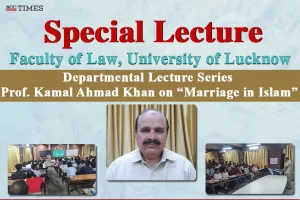“We have guided missiles but unguided men”
The Faculty of Law, Second Campus, University of Lucknow, successfully organized its Departmental Lecture Program on 20th September 2025. The program witnessed the enthusiastic participation of students and faculty members, reflecting the department’s ongoing commitment to academic enrichment and intellectual discourse.
The keynote speaker of the program was Prof. Kamal Ahmad Khan, an eminent academician and respected authority in the field of law. Prof. Khan delivered an insightful and thought-provoking lecture on the theme “The Marriage in Islam”. His words left a profound impact on the audience, bridging the understanding of law, religion, and society.
At the very outset, Prof. Khan captured the attention of the audience with a powerful quote: “We have guided missiles but unguided men.” This striking remark set the tone of his lecture, reminding everyone of the growing imbalance between technological progress and human moral guidance.
Moving into the central theme, Prof. Khan elaborated on the purpose and essence of Nikah (marriage) in Islam. He emphasized that Nikah should never be reduced to mere physical desire or guilty pleasure. Rather, it is a sacred social institution that binds individuals in mutual responsibility and contributes to the stability and moral fabric of society. According to him, the significance of Nikah extends far beyond the individuals—it is an institution that safeguards social harmony and preserves values for generations to come.
Professor Khan also highlighted intellectual contributions of various jurists who, over the centuries, have defended and enriched the conceptual framework of Nikah within Islamic jurisprudence. He contended that Nikah, in its true essence, ought to be understood not merely as a civil contract, but as a sacred sacrament. Emphasizing its sacramental nature, Professor Khan argued that Nikah embodies religious duty, mutual companionship, emotional solace, and the foundational structure for societal continuity. These elements, he noted, are reflective of the progressive and rational underpinnings of Islamic legal thought.
To substantiate this view, Professor Khan drew upon scriptural sources including the Qur’an and Ahdees, as well as classical and contemporary juristic opinions. He referenced the perspective particularly that of Justice Suleman, who emphasized the spiritual and moral dimensions of Nikah, suggesting that its nature aligns more closely with that of a sacrament than a mere civil contract. In this context, Professor Khan also explored the genesis and nature of contractual obligations in Islamic law, arguing that the institution of Muslim marriage transcends the formalistic boundaries of a legal contract and is deeply rooted in ethical, religious and spiritual obligation which makes Muslim marriage more sacrament rather than a contact.
To strengthen his analysis, Prof. Khan referred to a number of landmark cases decided by the Supreme Court of India and the Privy Council, illustrating how the judiciary has interpreted the institution of marriage and the freedom of religion. He skillfully connected these cases with broader constitutional principles, thereby deepening the students’ understanding of the relationship between law and religion.
The lecture further explored Articles 25 to 28 of the Constitution of India, which guarantee the Right to Freedom of Religion. Prof. Khan observed that religion is not only meant to prepare humankind for life in this world but also for the hereafter. This holistic view, he argued, should guide one’s conduct in marriage and other aspects of life.
The program was further honoured by the gracious presence of Dr. Lalit Kishor Srivastava and Dr. Rupam Lal, both of whom commended the lecture and encouraged the students to engage deeply with such discourses. Their presence added to the academic richness of the event.
The lecture concluded with an interactive session, where students expressed their curiosity and appreciation. The Departmental Lecture Program was not only a platform to learn about Islamic perspectives on marriage but also an opportunity to connect legal principles with social realities. It left the participants with new insights into the dynamic relationship between law, religion, and human values.

